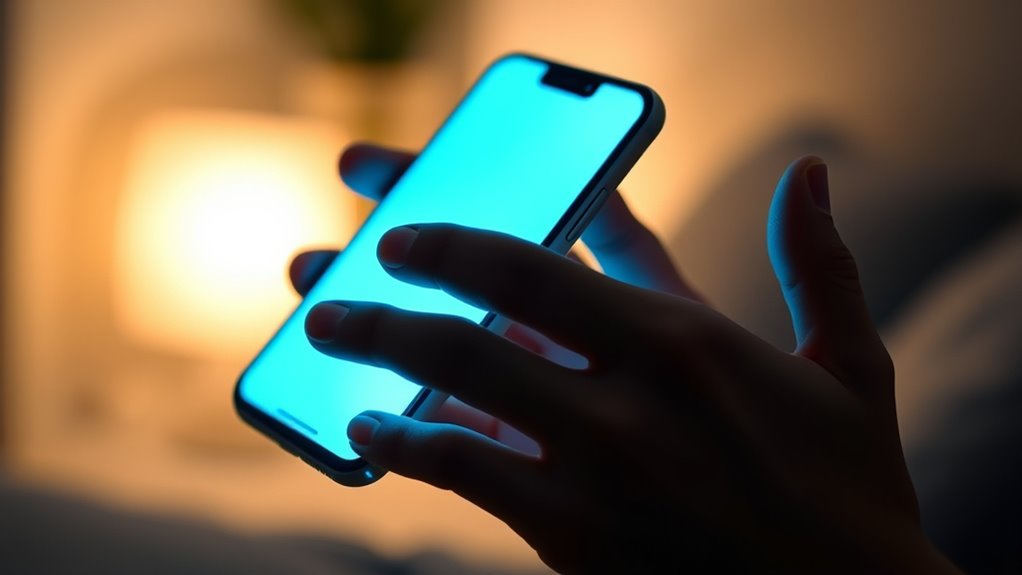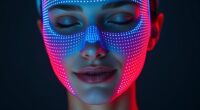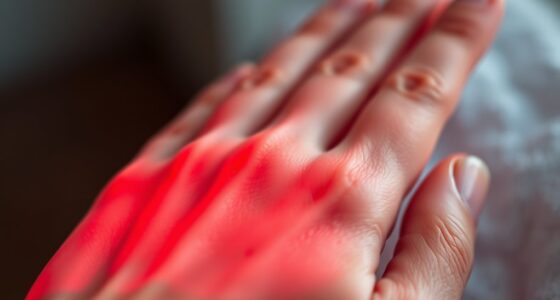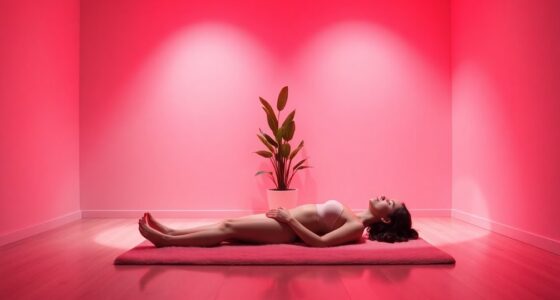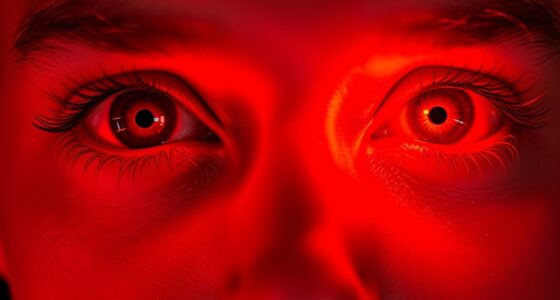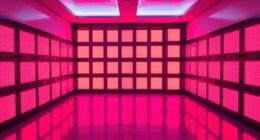To avoid blue light overuse and irritation, follow the 20-20-20 rule: look 20 feet away for 20 seconds every 20 minutes. Adjust your device settings to reduce blue light, and wear glasses with blue light filters if needed. Position screens at eye level and use proper lighting to minimize glare. Take regular breaks, stay hydrated, and create a balanced screen routine. Keep exploring for more tips to protect your vision effectively.
Key Takeaways
- Follow the 20-20-20 rule: look 20 feet away for 20 seconds every 20 minutes of screen time.
- Adjust device settings to enable blue light filters or night mode for reduced exposure.
- Position screens at eye level and ensure proper lighting to minimize glare and eye strain.
- Take regular breaks, blink often, and stay hydrated to maintain eye comfort and prevent dryness.
- Schedule routine eye exams and practice healthy habits to protect long-term eye health from blue light overuse.
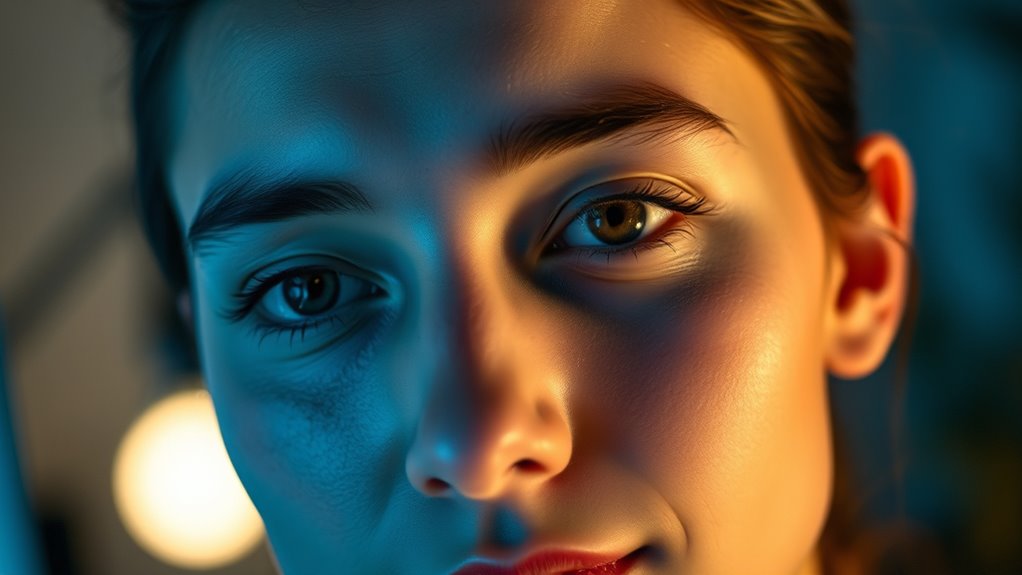
As digital devices become an integral part of daily life, understanding blue light safety is more important than ever. You probably spend hours each day staring at screens—your phone, tablet, computer, or TV—exposing yourself to blue light. While blue light isn’t inherently harmful in small doses, overuse can lead to digital eye strain, discomfort, and disrupted sleep patterns. Being mindful of how you use these devices can help you avoid overexposure and irritation, keeping your eyes healthier and your nights more restful.
Being mindful of your screen time helps protect your eyes and improve sleep quality.
First, recognize the signs of overuse. If your eyes feel tired, dry, or itchy after extended screen time, or if you experience headaches and difficulty focusing, it’s a clear signal to take action. You might also notice blurred vision or sensitivity to light. These symptoms aren’t just minor annoyances—they indicate that your eyes are under stress. The key is to listen to your body and address these signals before they worsen.
One effective way to reduce blue light exposure is to follow the 20-20-20 rule. Every 20 minutes, look away from your screen and focus on an object about 20 feet away for at least 20 seconds. This simple habit relaxes your eye muscles and reduces strain. Additionally, adjusting your device settings can make a difference. Many screens have built-in blue light filters or “night mode” options that reduce emission levels and make viewing more comfortable, especially in low-light conditions.
Another important step is to limit your screen time when possible. Set boundaries for yourself—perhaps by establishing specific times of day when you disconnect from devices altogether. Use physical barriers like glasses with blue light blocking lenses if you spend long hours in front of screens. These lenses can help absorb blue light before it reaches your eyes, providing an extra layer of protection against irritation and potential sleep disruption.
Incorporating proper eye care into your daily routine, such as regular eye exams and using appropriate lighting, can further prevent long-term damage from blue light exposure. Creating an ergonomic workspace also helps prevent eye strain. Position your screen at eye level to avoid neck strain and ensure you’re not leaning forward or squinting. Proper lighting in your environment minimizes glare and reduces the contrast between your screen and surroundings, which can decrease eye fatigue.
Finally, prioritize good screen habits outside of work or entertainment. Take regular breaks, stay hydrated, and blink frequently to keep your eyes moist. Maintaining overall eye health involves consistent habits that prevent irritation from blue light overuse. By being proactive and mindful of your screen habits, you can enjoy the benefits of digital technology without compromising your eye comfort or sleep quality.
Frequently Asked Questions
Can Blue Light Cause Permanent Eye Damage?
Blue light can cause some eye discomfort if you overuse screens, but current evidence suggests it doesn’t cause permanent eye damage. You might experience eye strain, headaches, or dryness from prolonged exposure, but these issues usually resolve with proper rest and eye care. To protect your eyes, follow the 20-20-20 rule and limit screen time, especially before bed. If you notice persistent issues, consult an eye specialist.
Are Blue Light Glasses Effective for Eye Protection?
Blue light glasses can be somewhat helpful, but they aren’t foolproof protectors. They may reduce eye strain and block some blue light, easing discomfort during long screen sessions. However, they won’t completely shield your eyes from potential damage or prevent all irritation. To truly protect your eyesight, combine wearing blue light glasses with good habits like taking breaks, adjusting screen brightness, and maintaining proper eye distance.
How Long Is Safe Exposure to Blue Light Daily?
You should limit your blue light exposure to about 2 hours daily, especially if you’re using screens for work or entertainment. Taking regular breaks, like the 20-20-20 rule (every 20 minutes, look at something 20 feet away for 20 seconds), helps reduce eye strain. Using blue light filters or glasses can further protect your eyes. Listen to your body, and if you experience discomfort, cut back on screen time.
Does Blue Light Affect Sleep Quality?
Yes, blue light can affect your sleep quality by suppressing melatonin production, making it harder for you to fall asleep and stay asleep. When you use screens before bed, you’re exposing yourself to blue light, which disrupts your circadian rhythm. To improve sleep, you should limit screen time in the evening, use blue light filters, or wear blue light blocking glasses. These steps help you sleep better and feel more rested.
Are There Any Natural Remedies for Blue Light Eye Strain?
Yes, you can try natural remedies for blue light eye strain. Taking regular breaks from screens helps, so follow the 20-20-20 rule: every 20 minutes, look at something 20 feet away for 20 seconds. Using natural remedies like eye drops with calming ingredients, applying cold compresses, and practicing eye exercises can also soothe your eyes. Additionally, make certain to have proper lighting and stay hydrated to reduce discomfort.
Conclusion
To protect your eyes, be mindful of blue light overuse, especially from screens. Taking regular breaks and using blue light filters can make a big difference. Did you know that adults spend over 7 hours a day looking at screens? That’s a lot of exposure! By managing your screen time and practicing safe habits, you can reduce irritation and keep your eyes healthy. Your vision is precious—take steps today to safeguard it.
